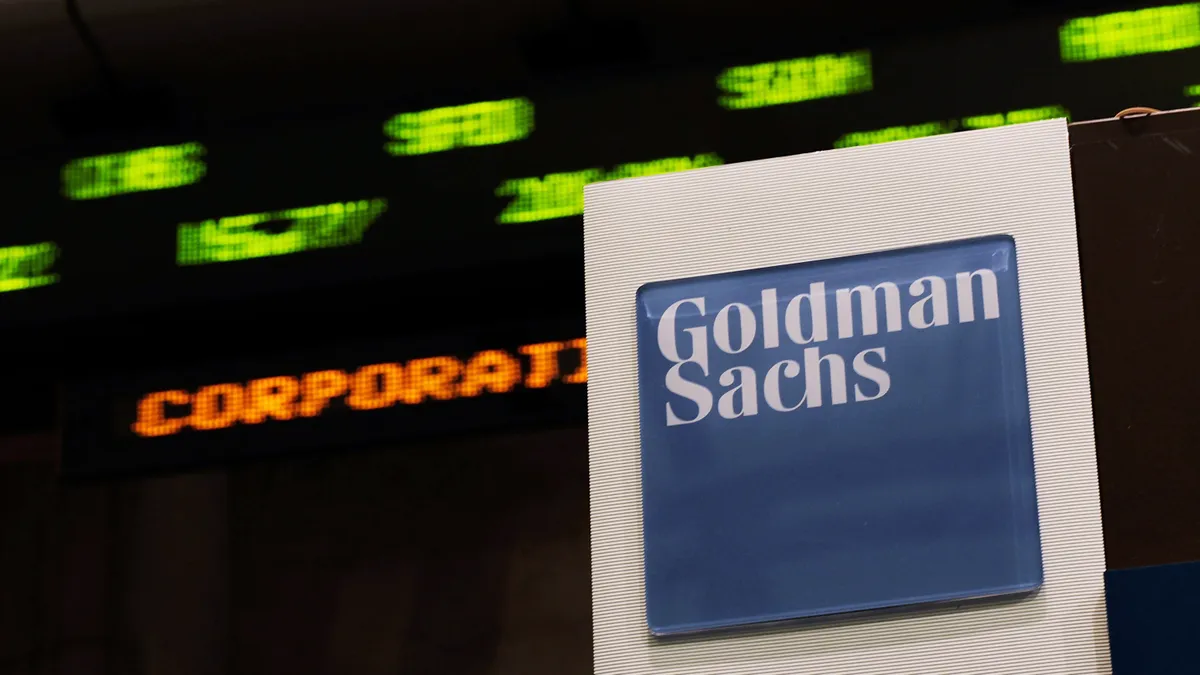Dive Brief:
- Goldman Sachs, beginning Sept. 6, will no longer require its workers in the Americas — except those based in New York City and Lima — to be vaccinated against COVID-19 to enter its offices or to test or wear face masks, according to a Tuesday memo citing updated guidelines from the Centers for Disease Control and Prevention.
- "In line with these updated protocols, if you have not been coming in to the office, please speak with your manager to ensure that you understand and adhere to your division’s current return to office expectations," the bank said, according to Reuters.
- The move follows a similar directive from Morgan Stanley, which told employees last week it would discontinue COVID testing requirements, as well as emails notifying employees of exposure and recommending quarantine and isolation. That policy begins Sept. 5.
Dive Insight:
In addition to vaccine-related policy updates, Goldman plans to stop distributing free antigen test kits at its offices by the end of this year, the bank said in Tuesday’s memo. Employees who buy tests, however, can apply for reimbursement through their insurance coverage, Goldman added.
“With many tools including vaccination, improved treatments and testing now available, there is significantly less risk of severe illness” associated with COVID-19 infection, the bank said, according to the Financial Times.
The bank indicated, however, that it would continue its contact tracing efforts.
It’s no coincidence that banks are clarifying COVID-related policy as summer’s unofficial end approaches.
“This is another way of Goldman Sachs saying, ‘School’s in session and we want you in person’ after Labor Day,” Wells Fargo analyst Mike Mayo told The New York Post, which first reported Goldman’s memo.
Monday marks the third Labor Day since the start of the pandemic, and several banks have used the holiday each year as a target date for calling staff back to the office.
“We continue to make steady progress bringing our people together in the office, which is core to Goldman Sachs apprenticeship culture and client-centric business,” a spokeswoman for the bank told The New York Post on Tuesday.
Goldman CEO David Solomon has long been an outspoken advocate of full-scale returns to the office sooner rather than later, calling remote work “an aberration” even before a COVID vaccine was widely available.
The bank asked about half of its workforce to return to the office in June 2021 — a development that was interrupted by the spread of COVID-19’s delta and omicron variants. Goldman reopened its New York headquarters Feb. 1, with roughly half of the employees based there working from the building, according to Fortune. And the bank has since tried to boost that percentage — including, allegedly, by electronically monitoring swipes of employees’ personal identification cards.
“People are in the majority of the week, but there will be a push post-Labor Day for people to be in full-time — back to business as usual,” an anonymous source close to the bank told The New York Post on Tuesday.
Unvaccinated New York City-based workers, as of Sept. 6, will still have to follow the local mandate, which requires those looking to enter a Goldman office to either be vaccinated or have a health or religious exemption.
Goldman isn’t the only Wall Street bank to update policy in light of new CDC guidelines, which no longer distinguish between vaccinated and unvaccinated individuals.
Morgan Stanley is asking employees who test positive for COVID-19 to continue to isolate for five days, and then wear a mask for five days, a person close to the bank told The Wall Street Journal. Employees who may have been exposed to the virus don’t need to isolate or quarantine, but should wear a mask for 10 days in the office and get tested on day 5, Morgan Stanley said, according to Bloomberg.
Like Solomon, Morgan Stanley CEO James Gorman cultivated a relatively hard-charging stance regarding office attendance — despite his own early bout with COVID-19. “[By] Labor Day, I’ll be very disappointed if people haven’t found their way into the office, and then we’ll have a different kind of conversation,” Gorman said last year. “If you can go into a restaurant in New York City, you can come into the office and we want you in the office.”
By December’s omicron outbreak, Gorman had modified his position. “I thought we would have been out of it past Labor Day and we’re not,” he said. “I was wrong on this.”
It remains to be seen, however, what effect next week’s policy changes will have on office attendance.
“It’s a game of chicken,” a Goldman insider told The New York Post. “Many junior bankers will continue to work from home and the office around their own schedules and see what the repercussions are.”











